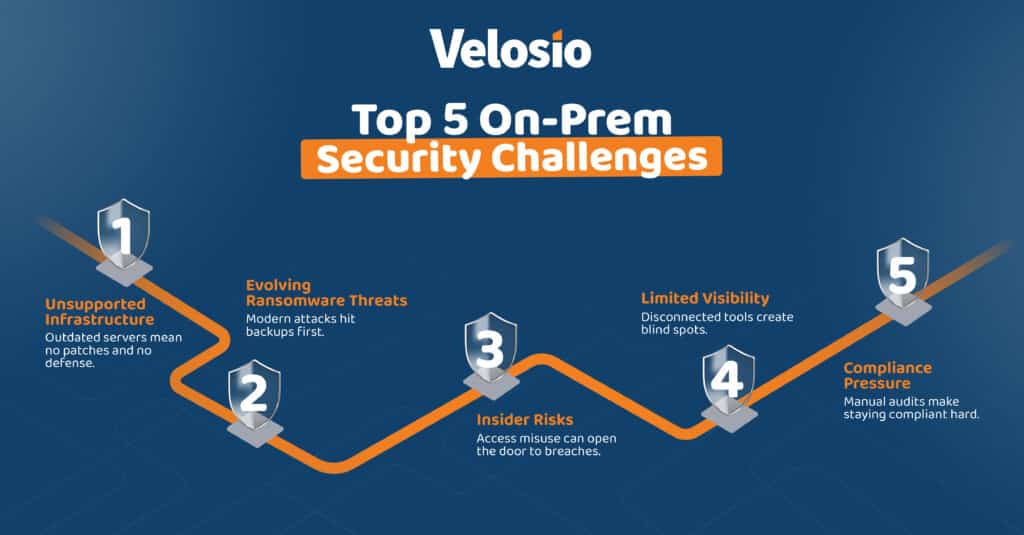The Ultimate Guide to On-Premises Security in a Hybrid World
Learn the top 5 on-premises security challenges, from ransomware to unsupported servers. See how Azure Arc extends cloud security to your data center without migration.
As businesses adopt hybrid models to leverage both on-premises control and cloud flexibility, the security perimeter has become increasingly complex. This new reality demands a renewed focus on on-premises security to protect vital infrastructure from modern threats.
On-premises security refers to protecting the server, application, and data of a physical data center. In cloud security, the hosting provider stays responsible for handling patching, monitoring, and infrastructure updates. However, organizations remain accountable for on-premises security.
Since the organization operates in both physical and virtual environments, the distinction between cloud and on-premises security has become increasingly difficult to discern.
Securing on-premises environments is not as simple as it was before. IT leaders face several challenges that can put both their operation and reputation at risk. Some of these challenges can come from outdated tools and compliance issues.
Here are the top 5 challenges organizations face in implementing their on-prem security:

Many businesses still rely on end-of-life systems, such as Windows Server 2012/R2 or outdated Dynamics ERPs. Once support ends, these systems stop receiving security patches, which leaves them dangerously exposed to attackers. Running on unsupported infrastructure is not just a technical debt problem but an active liability.
Cyberattacks have become increasingly advanced over the last decade. Modern ransomware can remain dormant for weeks, making it challenging to identify. Then, they suddenly infiltrate networks, strike by encrypting data, and target banks. Cyberattackers target organizations that rely mostly on on-premises data storage.
It is not always that a threat will come from the outside. Employees with access to critical can also unintentionally create weakness in the security. Sometimes, they can also intentionally cause damage for their personal benefits. An on-premises environment needs strong access control and monitoring to prevent damage caused by an insider.
An IT administrator may need to switch between multiple tools and manual processes to manage a fleet of on-premises servers. It can lead to fragmented visibility, security weakness, and delayed response time in emergencies. The lack of centralized control can be mainly responsible for the failure to prevent a breach.
From HIPAA to GDPR, proving compliance is a constant challenge for on-prem environments. Manual audits, fragmented reporting, and inconsistent policies can increase an organization’s vulnerability to security risks and regulatory penalties.
Here’s the good news: you don’t need to fully migrate to the cloud to gain cloud-grade protection.
Azure Arc acts as a bridge, projecting your on-prem servers into the Azure control plane. In simple terms, it lets you apply Microsoft’s powerful cloud security and management tools to servers running in your own data center.
Key Benefits Include:
This hybrid model offers the best of both worlds: maintaining your on-premises investments while enhancing them with cloud-powered security.
Legacy systems, such as Microsoft Dynamics, often serve as the primary tools for finance and management for a business. However, in many cases, they aren’t on a backdated system. It can make them ineffective and highly vulnerable to on-prem security threats.
Here’s where the Azure Arc bridge can become really useful. Instead of forcing a costly and disruptive migration, Arc allows you to extend cloud-grade security, governance, and monitoring directly onto these legacy environments.
It provides centralized oversight, continuous threat protection, and extended security without requiring application rewriting or relocation. This tool ensures that the most critical systems remain protected against modern threats for organizations relying on Dynamics or other legacy ERP systems.
In 2025, on-premises security is more about creating an innovative and hybrid approach. Since the business can no longer rely on traditional defenses, it needs a solution that bridges the on-premises environment with the cloud system.
That’s precisely what tools like Azure Arc deliver. It lets you apply cloud-grade security and management to your existing infrastructure. So you can handle significant cyber and data breach risks without a complete migration.
Ready to discuss how you can secure and stabilize your on-premises servers? Get in touch to schedule a discovery call with our consultants.
Talk to us about how Velosio can help you realize business value faster with end-to-end solutions and cloud services.